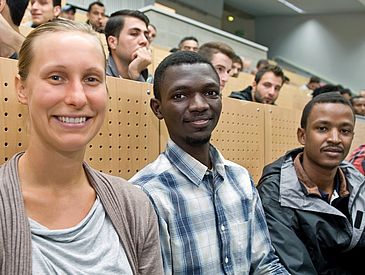Zohreh Hakami learnt German completely by herself, while living alone in her temporary refugee lodgings in Bremen. The 30-year-old refugee from Iran already has a Bachelor degree in Business Administration. “I want to continue studying here to get my Master’s”, she says. However, until her degree is recognized here and she can be enrolled as a regular student, she is participating in the University’s IN-Touch program. “It’s a wonderful opportunity for me to get a taste of what studying is like here and to improve my German”, she says.
IN-Touch is now going into its fourth round. In winter semester 2015/2016, 140 refugees will be able to take up studies as Gasthörer[special auditors]. This time round, the Bremen University of Applied Sciences is also participating as partner in the program, for its part offering 40 refugees the opportunity to attend courses and lectures. There is enormous interest in the program. The number of 140 special auditors this semester is twice as many as in other semesters all told. During a kick-off event held in the University’s main lecture hall known as the Keksdose, it was perfectly quiet as they listened attentively to a welcoming address by Vice Rectress for International Affairs and Diversity, Yasemin Karakaşoğlu: “When you fled your home countries you also had to abandon your academic homes. Now we want to give you an insight into studying at a German university. She called upon the listeners to bring in their knowledge and experiences: “They are enrichment for all of us.” Currently, although the guests are able to attend courses and lectures, they cannot be awarded credit points. Instead, at the end of the semester in March 2016 they will be issued with certificates of attendance. Many of those present would like to have more and want to be recognized as regular students. “I ask you to be patient”, said the Vice Rectress, “…everyone concerned is trying to find a quick solution. However, there are some legal hurdles we have to overcome first.”
Hassan Mohammed learnt English while he was living in Sudan, where the 26-year-old already attended university for four years. He wants to be a teacher. “I’m aware that here in Germany you must also have a second subject”, he says. He hopes to find out what that second subject could be while participating in the IN-Touch program. His friend, Alfadil Omer Abker, studied physics in his home country. He now wants to study chemistry at the University of Bremen. Both are full of expectations. They travelled to Bremen for the day from their refugee accommodation in Osnabrück because they had heard of the special program here. Now they are worried about how to pay for monthly train tickets they will need to commute. Tharek Ghabra from Syria speaks for a group of young people who came from the temporary tent accommodation next to the NW1 building on the campus. He says, “We are very grateful. It’s a great opportunity.”
With its IN-Touch program, the University of Bremen was the first academic institution in Germany to open its doors to refugees with academic backgrounds. Meanwhile, several other universities have followed suit and are now offering similar programs. Yasemin Karakaşoğlu says jokingly, “In academia, copying is usually strictly forbidden; but in this case it is specifically welcomed”. The EU Commission has also officially recommended IN-Touch as a model to be replicated. At the opening event, it was clear just what a success the project is turning out to be. The refugees are highly appreciative of the help and support they are being given. There was frequent spontaneous applause for the speakers and the large number of volunteer helpers, in particular the students who have volunteered to accompany the refugees on their return to academic life. Notwithstanding, Jens Kemper, the program coordinator, said in all frankness: “It won’t be easy, but we can.”

